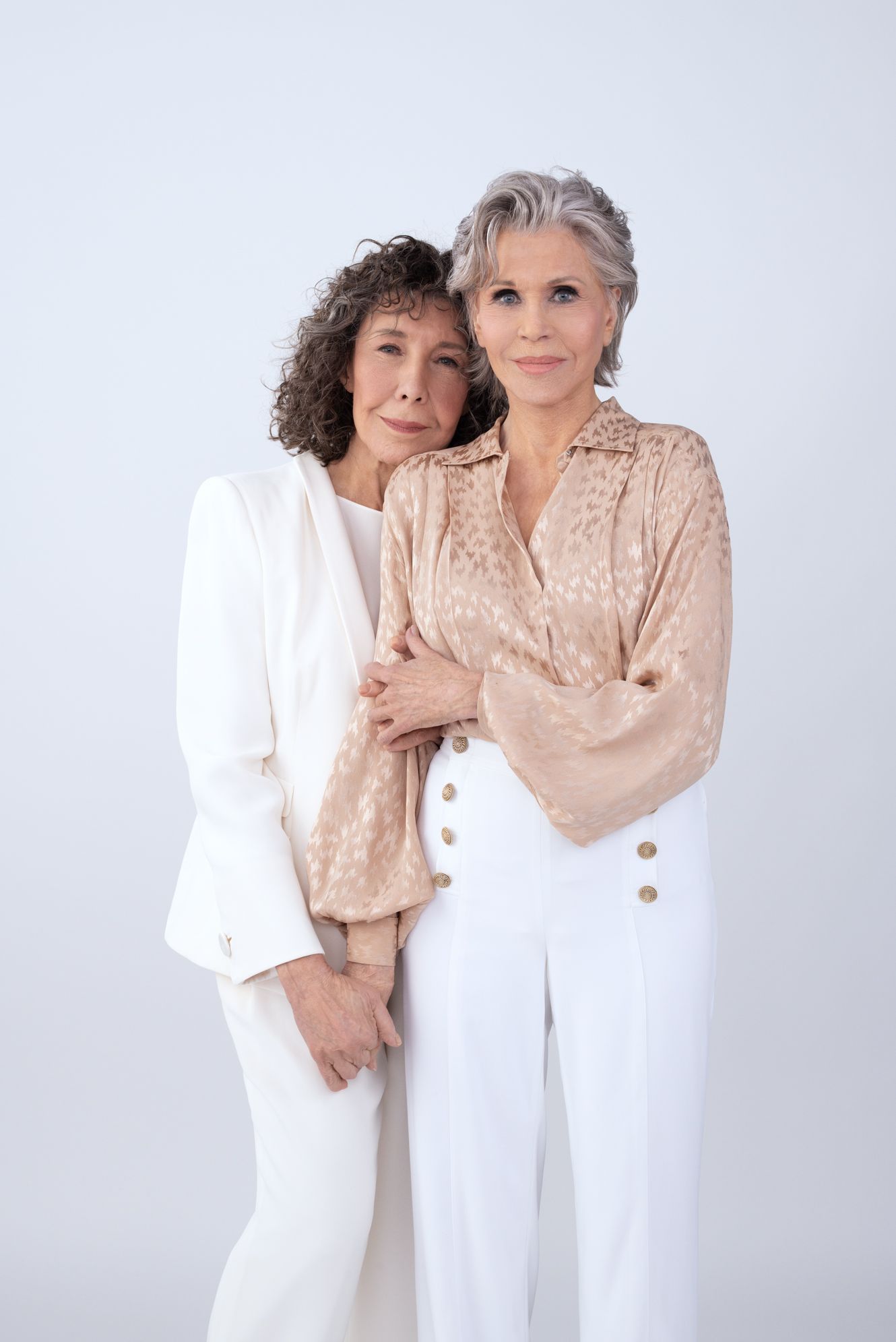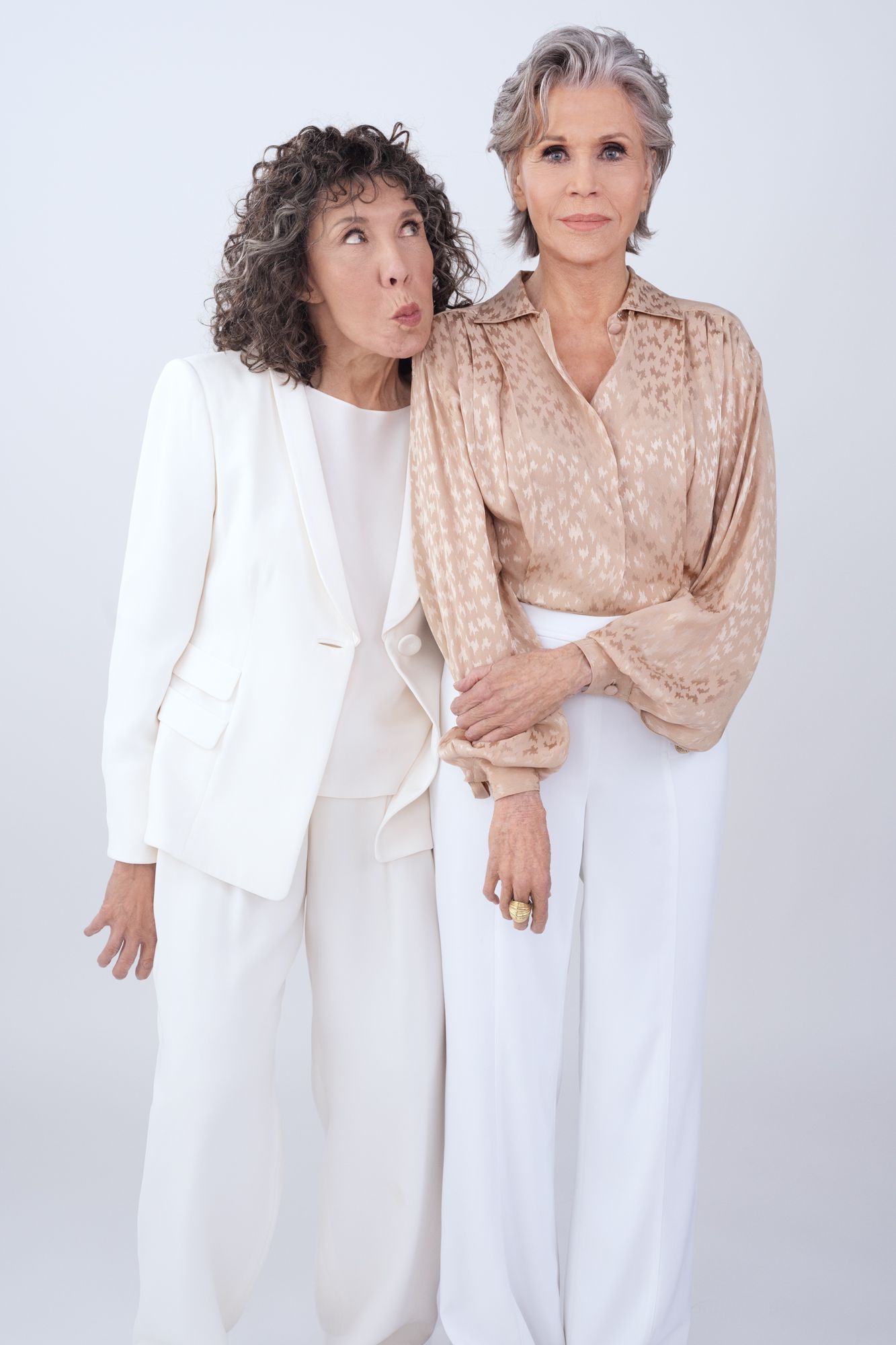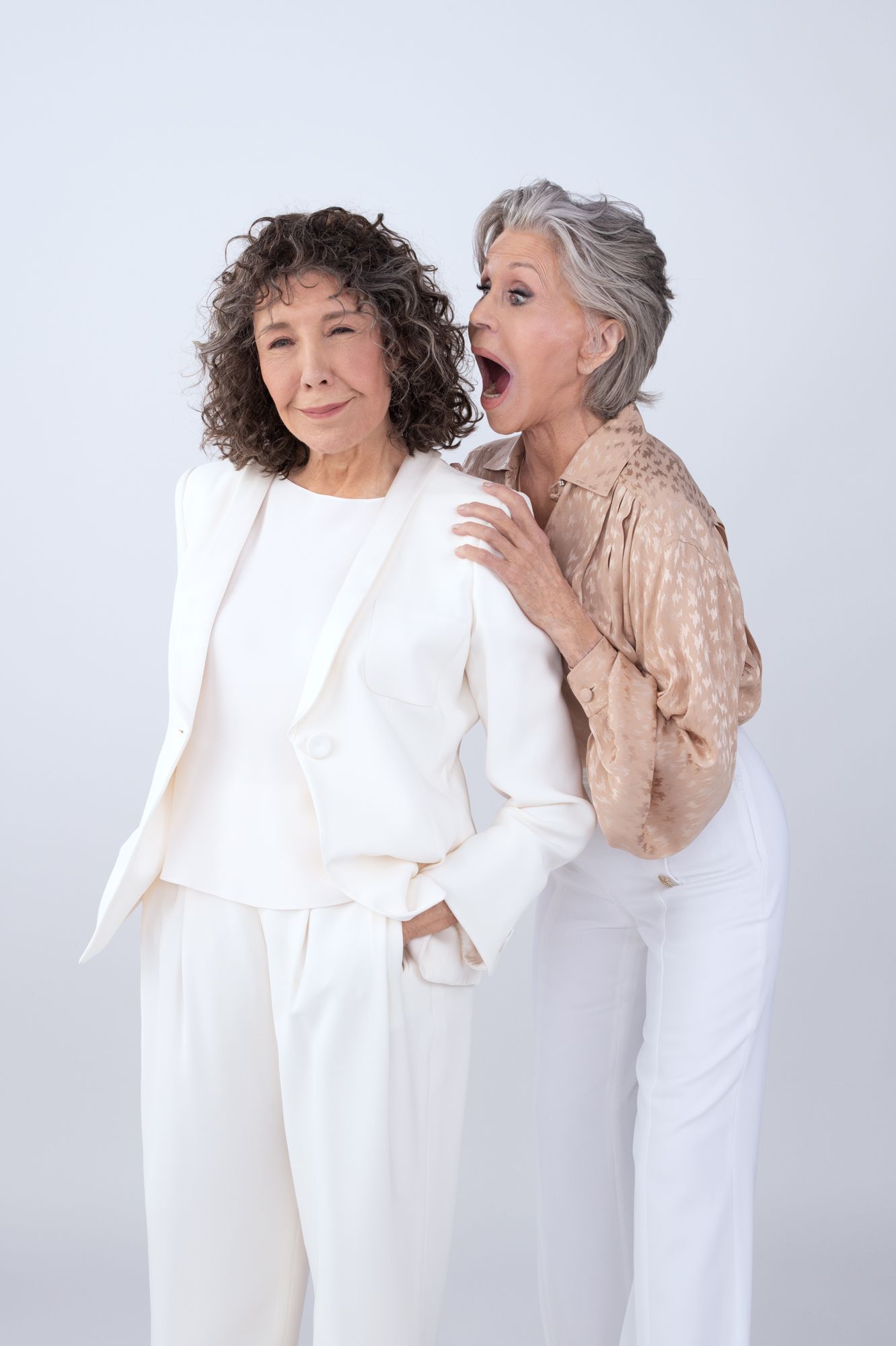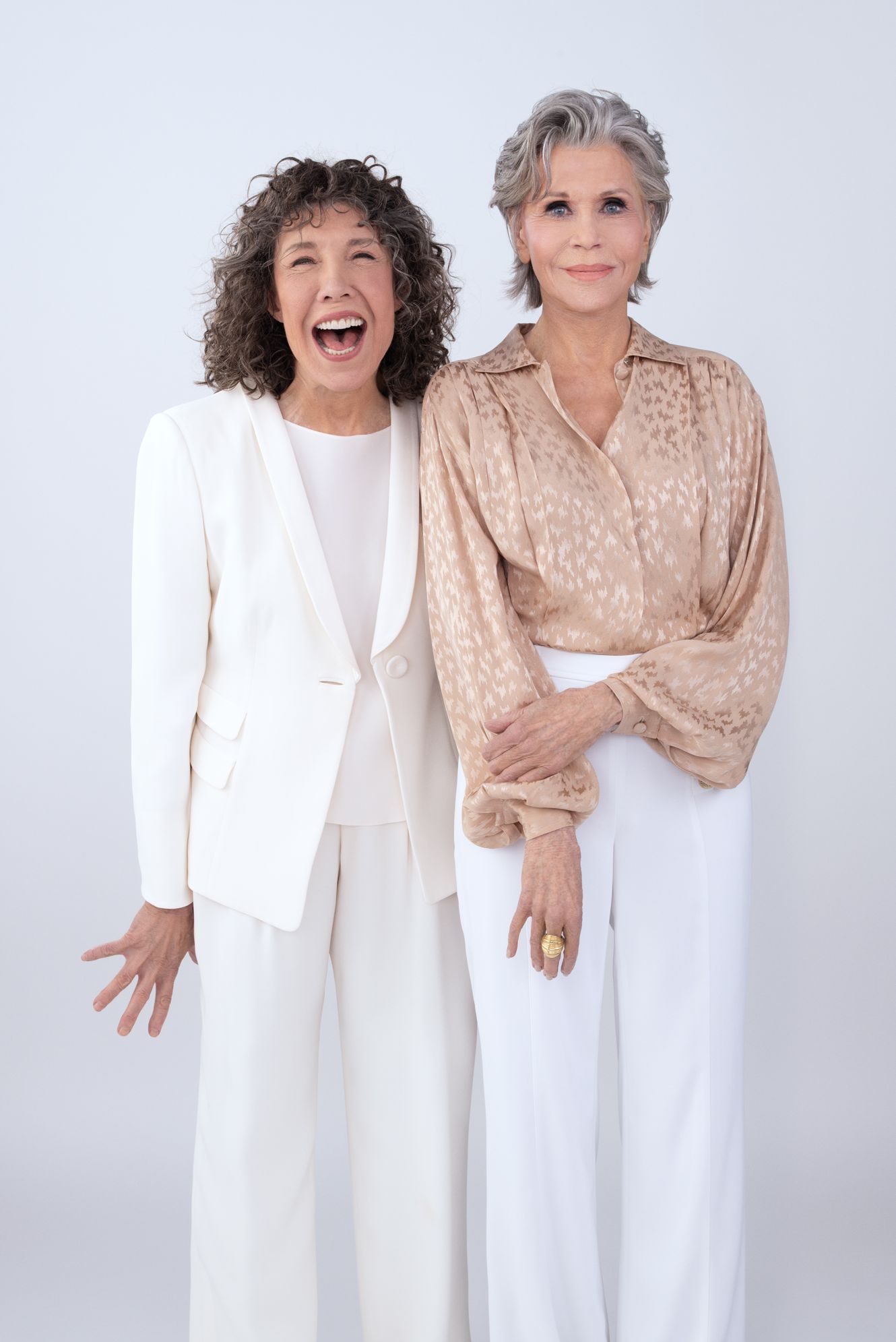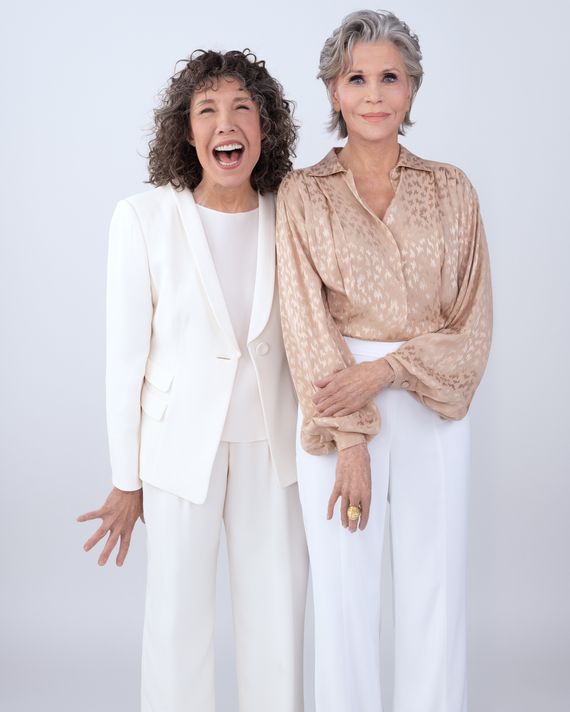
Over the decades, Jane Fonda’s and Lily Tomlin’s careers have hopscotched through various social spheres and weathered political crises and middle-aged invisibility to return with a late-career renaissance during the streaming wars. On Grace and Frankie, Netflix’s longest-running original series, the final episodes of which air April 29, they play rivals turned besties when their husbands fall in love with each other. They just finished a revenge comedy, Moving On, about two old friends reconnecting at a funeral; now they’re filming 80 for Brady, a movie about octogenarians passionate about Tom Brady’s throwing arm. Meeting over Zoom at the start of April, Fonda, 84, in full incognito soccer-mom regalia — sunglasses, a beanie, and an eggplant tracksuit she will zip up to her chin — is forthright about what she would and wouldn’t like to talk about; Tomlin, 82, in a brown jacket and chunky necklace, is more improvisational and circumspect. Fonda has described her life as being determined in some part by men (her father, her husbands), but onscreen, she feels most herself with Tomlin as her closest conspirator.
Who would you slap at the Oscars if you had a chance?
Lily Tomlin: I’m not too good at slapping. I wouldn’t.
Jane Fonda: I wouldn’t slap anybody at the Oscars. I don’t think it’s appropriate. There’s people I’d slap somewhere else.
What do you think about the entire situation?
LT: It’s like pop culture. It’s here today. This is lagging around longer than most stuff. Why is it so shocking to see an actor slap another actor? I’ve had cameras hidden on set that have revealed me having a set-to with a director. [Tomlin is referring to a video from the set of I Heart Huckabees showing director David O. Russell calling her a “cunt” while throwing things.] You expect things like fights within the family. When you’re making a film, that’s your family. You don’t expect to share it with the world, but if it happens, you swallow it and go on.
JF: It was an unfortunate incident and it shouldn’t have happened, but we’re facing an existential threat called the climate crisis. There’s a war in Ukraine. There are things that are much more important that are going to bring our civilization down if we don’t deal with it. So I don’t want to spend too much energy thinking about Chris Rock and Will Smith.
Okay.
JF: I’m saying that generally, not to you.
Well, in some ways we are here to talk about the end of a TV show. Was it the right time to wrap up Grace and Frankie, or do you think you could have gone on for another seven seasons?
LT: It was time. Things have their life and then things come to replace it.
JF: We’ve made two movies together since then.
This is probably the longest period of time you’ve worked together, isn’t it?
JF: I think it’s never happened before, actually — that two actors have spent seven years doing a series together and then, wow, a movie, and, wow, another movie together.
How has your relationship evolved over this time period?
JF: I love her deeply. I liked her before, but I know her better now. I feel safe with her. We shot a scene in 80 for Brady yesterday where myself, Lily, Sally Field, and Rita Moreno are in bed in a motel. I’m in bed with her, and without even thinking about it, I spooned her. It just felt really great. I don’t know of another actor I’d do that with.
LT: After being Grace and Frankie for so many years, we often wound up sleeping in the same bed.
Jane, in the past you’ve talked about feeling attracted to strong personalities in men, like your husbands. Did you feel the same way about Lily?
JF: Yeah. It started the first time I ever saw her onstage. I was not a television person. I had never watched Laugh In, but I saw her in a one-woman show in Los Angeles in the ’70s called Appearing Nitely. I had never seen anything like it in my life. I wanted to attach myself to her in whatever way I could. I said to myself, “I don’t want to make a movie about secretaries unless she’s in it.” Now it’s become, “I don’t want to ever work again unless she’s in it.”
LT: Ever since I saw Klute, I’d cut my hair like her character, Bree Daniels. When she came backstage, I thought she had a cape on. She swept in like a force of nature, her hair flying.
JF: All the people Lily became had soul. And it just doesn’t happen that people are seriously funny and also have soul, and perspectives on the cosmos, and wisdom.
LT: So much of that sensibility comes from my partner, Jane Wagner. When we first met, we immediately were exchanging stories about the same kinds of feelings, thoughts, and aspirations.
JF: Jane Wagner is Jane one. I am Jane two. Sometimes I write to Lily and I sign “J2,” so she’ll know.
What I like about Grace and Frankie is the spikiness of female friendship — their entire dynamic at the outset is very “opposites attract.” Grace is the uptight one, and Frankie is the hippie. Have there been moments of difficulty you’ve worked through together?
JF: I don’t think so.
LT: Anything that would happen we’d think was not important. It might have been momentary, or maybe I felt some way reacting to something. But you forget about it. There’s something fundamentally strong you can’t destroy.
I guess I think all relationships take work, even our friendships.
JF: We don’t hang out. I don’t hang out with anybody.
LT: You don’t have time to hang out.
JF: I don’t hang out. We’re either working together, or we’re raising money. She’s been to my house many times but always for fund-raisers. Oh, no, that’s not true, because I have dinner parties and you come to them. And they’re fun, aren’t they?
LT: Yes.
My understanding was it was difficult to convince Lily to do 9 to 5.
JF: Oh my God, a nightmare. Took a year to persuade her and Dolly to do the movie. And then two days on this thing, she said, “I want to quit.” She asked us to let her out of her contract because she didn’t think she could do it. She steals everything — the movie, the series — but she always starts out saying, “I don’t know how to do this.”
What convinced you to keep doing it?
LT: Well, first of all I’d only done two or three movies by that time—Nashville, The Late Show. We stopped in the middle of Shrinking Woman so I could do 9 to 5. We had a lot of special effects on Shrinking Woman, and one day I saw the dailies of the scenes with animation. There was no animation there, and I was singing. I said, “Oh, I’m just so awful. What am I going to do?”
I couldn’t bear to go to Jane. So I went to her producing partner, Bruce Gilbert. I said, “Bruce, you’ve got to let me out because I’m going to ruin this whole movie.” The next day I saw the dailies from that day. And I thought I was pretty good. The way I convinced myself to make it, anyway, was by saying, “We’re like a bunch of office workers who’ve been hired to make a demonstration film for the body of workers all over the country.” I felt like I could do it if I played that role.
Do you generally second-guess yourself at the beginning of a project?
LT: It’s never what you hope it to be. Even then, it might get great notices or it’s a big success financially, so you forget all the stuff that went before. But I’m always a little afraid to start. I’m not afraid when Jane and I produce a play ourselves.
JF: This is Jane one.
LT: That I felt okay about because I knew what it was. When somebody else writes something, I’m not sure what they’re intending. I can’t always tell.
JF: All of that is because she has got a lot of depth to her. I’m very superficial, so I don’t worry about it most of the time.
Was 9 to 5 informed by any personal experiences with sexual harassment in the workplace?
JF: No. I had one experience with sexual harassment. It was a French director, not the one I married — another one.
Godard?
JF: Oh God, no. I would’ve slapped him, to circle back to the first issue. It was another director. I won’t say his name, but he said to me, in French, “The character has an orgasm in the movie. I need to know what your orgasms are like.” I pretended I didn’t understand and laughed. 9 to 5 was informed by what I learned from secretaries and from labor organizer Karen Nussbaum.
LT: I’ve certainly been an office worker. So I was familiar with all kinds of life’s aspects. I look at them as material, as something to think through and try to figure out what to do with it, to be meaningful and compassionate if possible. You hope you can find other aspects to it that make it human and resonant so it has a bigger underbelly. Dabney Coleman was the villain in this piece, but he’s so comedic and wonderful he creates a larger image than this narrow predator. He gets his comeuppance at the end, but that’s meaningful entertainment. You just want it to be good.
JF: Patriarchy. That’s the underbelly.
LT: When I say what good means to me, it’s something that’s fulfilled.
Rather than pure polemics?
JF: I handle the pure polemics so she can be human.
I don’t think that’s true, Jane.
LT: It’s not true at all.
Is a 9 to 5 sequel happening? What’s the status?
JF: Boy, I wish, because it’s needed. The situation in the office now for women and men office workers is worse in many ways than it was then. They’re usually contracted out from a company, which means they have no protections whatsoever. If we made this movie today, all three of us would have second jobs. We just couldn’t get a script that expressed the new reality, truthfully, with humor. It’s very difficult to do it.
I’m interested in hearing about your relationships to women’s liberation back when it was happening.
LT: I would count feminists as my friends. I certainly believed in the principles. I’d have quarrels with people who were too narrowly feminist. One of them didn’t want me to be in this fund-raiser for the Woman’s Building in L.A. because I was famous. There were very funny aspects to the goings-on at that time, particularly in the early ’70s, when people were more radical. They had to viciously be for something.
JF: The feminists I knew felt if you weren’t a lesbian, you weren’t a feminist. I became an activist because of the war in Vietnam. There was a time where I was on the road going to military bases to talk to soldiers. A friend called me from New York and said, “There are 5,000 women in the streets for the women’s movement.” I wrote in my diary, “It deflects from what’s really important, which is the war. We have to end the war.” It seemed like a waste of time. I didn’t get it. It took me a while. I couldn’t be a true feminist while I was married because my marriages were all compromised. Once I was single, I got it quick. I went to see The Vagina Monologues, and it was during the part that I was laughing, when my guard was down, that I could feel the feminism move from my head and into my body.
So maybe you do have to be a lesbian to really be a feminist.
LT: No.
JF: No way. You can be a feminist lesbian, but you can also be a feminist married woman.
I’m just kidding.
JF: I know you are.
Jane, you’ve said your marriage to Ted Turner was a turning point in terms of understanding feminism personally.
JF: Alpha men, bless their hearts. I’ve been married to three of them and they were all fabulous. But it’s like having a front seat at the patriarchy, up close and personal. I knew what that meant. I couldn’t live that life with this man and be a true feminist because I wasn’t being true to my own self.
LT: I don’t know if there were any men functioning at that point. I mean, I don’t know if they were expanded and open.
A lot of conversations around gender today are centered on trans rights. There was a recent controversy at Netflix about Dave Chappelle’s special. I was wondering what you thought about the employees’ demands for more money going into funding trans-led shows?
JF: Trans people are in danger. They’re killed, they’re injured every day, like Asian people suffering attacks and things like that. Anything that can be done to do away with otherness needs to be done. Netflix is a good place to start. I don’t know Reed Hastings, but I know Ted Sarandos pretty well. He’s a terrific guy with a huge heart. I agree with the employees’ demands, although I didn’t see the Chappelle show.
LT: And how did the network respond?
Initially, Ted Sarandos wrote a memo to the company saying he had a strong belief “that content on screen doesn’t directly translate to real-world harm.”
JF: Don’t agree.
LT: Yeah.
Have you talked to Ted about that?
JF: No.
Maybe you could write him an email.
JF: I do send him emails. I haven’t seen him in person since I went and visited him two years ago and asked if he could let me out of my contract for Grace and Frankie for a year so that I could go and spend a year getting arrested in D.C. And he didn’t do it, because he’d signed everybody’s contracts. But the screen has a lot of impact on how people behave in the real world. And he took back that statement, actually.
Did you ever want to run for office?
JF: I’ve considered it.
Can I ask what it would be for?
JF: Takes too much time. But the only reason I would ever consider running for office it would be for a very short period of time in order to make something important happen. Here, in California, we’re a very important state when it comes to the climate crisis because we’re an oil-producing state. And the elected officials in California should be doing all they can to stop issuing permits for more oil wells and fracking pits and to shut down existing wells that are poisoning people. I don’t particularly want to live as an elected official, but I’ll do about anything to address the climate crisis. Because we only have eight years left and it’s totally urgent. That’s what I’m going to be devoting a whole lot of the rest of my life to. Which doesn’t mean much, because I’m 84.
Both of you have been talked about as ahead of your time politically. Has there been a moment when you felt behind or an issue that, in a moment of reevaluation, you’ve come around on?
LT: I feel like I’ve always been on the right side because I’m just for a better life for more people.
JF: I haven’t been on the wrong side, but I’ve been a meaningless blob of hedonism for the first decades of my life. And I’m not ahead of my time. I’m always late. Because I’m famous, it seems like I’m the first one. But I’m totally derivative. I come late to everything and then I make a big ruckus.
What do you attribute the longevity of your careers to?
LT: At the right place, the right age, at a certain juncture in history. Grace and Frankie fell into our laps like a gift from heaven. I suppose the time will come when I won’t be able to ambulate. And then I’ll slowly fade from the view of the public.
JF: Chronological age is meaningless. My dad died six years earlier than I am now. He seemed so old because he had a heart disease. Health is key. Rita Moreno is 90. You would never know. It’s about staying relevant, staying up with the times, looking decent and then throw a little luck in there.
Okay. It’s 4:01. I have another call I have to go to — for the record, it’s Patrisse Cullors, co-founder of Black Lives Matter.


